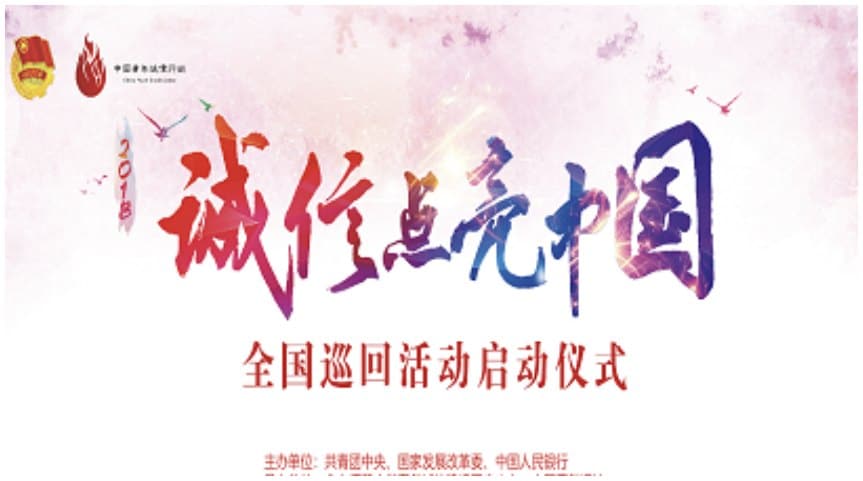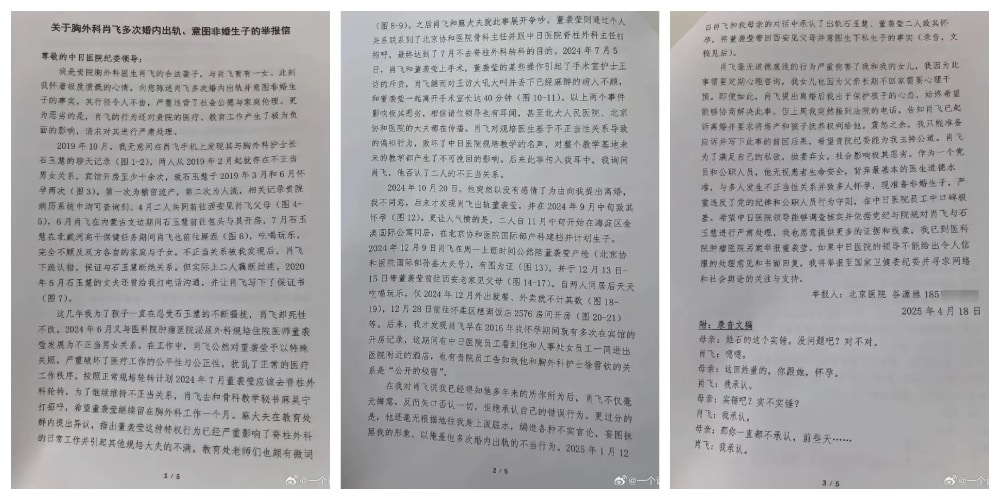China Insight
“Be as Good as Your Word”: The Chinese Social Credit Song is Here
Chinese pop stars sing about the importance of trust in this ‘social credit’ music video launched by the Communist Youth League.
Published
6 years agoon
First published
“Be as Good as Your Word” is a pop song featuring young Chinese celebrities who sing about the importance of being ‘trustworthy.’ The new music video is part of a bigger initiative propagating China’s Social Credit System among the younger generation.
No matter where you go in China nowadays, the idea of ‘trust,’ ‘integrity,’ ‘creditworthiness,’ and ‘social credit’ is promoted virtually everywhere: in the media, in trains, in banks, in traffic, and in public announcements on the streets.
Now, there is a song that comes with China’s ubiquitous official government and media narrative on the importance of ‘trust’ and ‘credit’ in Chinese culture and society.

“诚信“ (“integrity” or “creditworthiness”) promoted on a sign in Shanghai, April 2019 (Whatsonweibo).
“Be as Good as Your Word” (Shuō dào zuò dào 说到做到) is a song and music video released under the guidance of the Communist Youth League (共青团), China Youth Daily (中国青年报), and the China Youth Creditworthiness Operation Office (中国青年诚信行动办公室), in cooperation with Chinese music streaming platform Kugou (酷狗音乐).

The song is performed by Roy Wang (王源) from the ever-popular Chinese boy band TFBoys, Chinese actor and singer-songwriter Timmy Xu (许魏洲), actor Wei Daxun (魏大勋), actresses Crystal Zhang (张天爱) and Shen Yue (沈月), Chinese actress/dancer Wang Likun (王丽坤), and a group of Chinese students.
The lyrics are by well-known musician Cui Shu (崔恕), and the music is by composer Zhao Jialin (赵佳霖), who had an Internet hit with “Little Apple” and also worked on the theme song for the Beijing 2022 Winter Olympics bid.

In the song, the performers sing about living up to one’s promises, stressing the importance of credit for the future, and that “being as good as your word” (“说到做到”) is what the “trustworthy youth” (“诚信青年”) is all about.

‘Creditworthiness’ (诚信) is central to the music video.
The word ‘chéngxìn‘ (诚信) is mentioned and displayed throughout this music video. It stands for ‘integrity,’ ‘honesty,’ and ‘trustworthiness,’ and is one of China’s Core Socialist Values. In light of China’s emerging Social Credit System, as pointed out by China Law Translate here, it is mostly used “in terms of a moral assessment component,” and also stands for “creditworthiness.”
This idea is also reiterated in the video, that shows various levels of being ‘creditworthy,’ for example as a consumer of the sharing economy, but also as a businessman sealing deals.

Although this pop song makes no direct reference to China’s nascent Social Credit implementation and is quite general (and poetic) in stressing the importance of honesty and “matching one’s deeds to one’s words,” it was launched in the context of “Credit China” (信用中国) and is part of a bigger initiative propagating the Social Credit System among China’s younger generations.
In November of 2013, during the Third Plenary Session of the 18th CPC Congress, new plans were adopted to “establish and improve a social credit system to commend honesty and punish dishonesty” (USC 2013). In 2014, the Chinese State Council officially announced its plans on building and standardizing a ‘Social Credit’ system, that should go nationwide in 2020.
Under this scheme, as explained by Genia Kostka, “individuals, businesses, social organizations, and government agencies are assessed based on their ‘trustworthiness'” (2018, 1).
As of now, there is no unified system in place yet, although there are many different local initiatives relating to Social Credit. Daum (2017) describes it as a ‘policy’ or ‘ideology of data use’ rather than a ‘system’, characterizing this policy as “the Chinese Party-State’s shorthand for a broad range of efforts to improve market security and public safety by increasing integrity and mutual trust in society.”
(For more information about China and Social Credit, please check our articles here).
“Creditworthiness Lights Up China”
The hashtag used to promote the Be as Good as Your Word song on social media platform Weibo is “Creditworthiness Lights Up China” (#诚信点亮中国#, also translated as ‘Integrity Lights Up China’).
The Weibo hashtag page, which has now been viewed over 340 million times, is hosted by China Youth Daily, the official newspaper of Communist Youth League of China. The description of ‘Creditworthiness Lights Up China’ is as follows:
“The youth emphasizes trustworthiness, credit is valuable; every aspect of life contains concepts of creditworthiness [integrity]. Let’s give the thumbs up for creditworthiness, and unite in building Credit China together.”**
‘Creditworthiness Lights Up China’ is a project that was launched in 2017 by the Communist Youth League, China’s National Development and Reform Commission, and the People’s Bank of China. Its specific aim is encouraging China’s younger generations to be trustworthy and educating them about credit.

“Creditworthiness Lights Up China”
Last year, there was even a national ‘Creditworthiness Lights Up China’ tour, which visited 300 universities in 100 cities throughout the nation to teach young people about China’s establishment of the Social Credit System and the country’s nascent ‘trust culture’ at large (Xinhua 2018).
The Be as Good as Your Word music video focuses on the importance of trustworthiness in multiple realms of society. The scenes are set in various settings, showing school life, business meetings, and Chinese consumers embracing new technology.

China’s sharing economy is specifically highlighted in the video, making it clear that ‘trustworthy’ people can enjoy the benefits of using shared bikes or credit-based libraries.

By also integrating these scenes, this video is not only about the nascent Social Credit scheme, but also about China becoming a more credit-based society overall.
The government’s plans on China’s ‘Social Credit System’ (社会信用体系), the Central Bank’s endeavors to build a stronger personal credit industry (个人征信行业), and commercial credit initiatives such as Alibaba’s Sesame Credit (芝麻信用), have been major developments over the past six years, all contributing to the ‘credit-ification’ of China.
“We’ll Build on Trustworthiness Together”
Since Be as Good as Your Word was launched on April 22, the initial post promoting the music video has been shared more than 492,400 times on Weibo.

The video’s popularity, however, perhaps says more about the pop stars it features than the message it propagates.
Crystal Zhang, for example, has 15.6 million followers on her Weibo account. TFBoys member Roy Wang is among the top Weibo celebrities and has more than 72 million fans on his Weibo page.
Wang’s own post about the video attracted more than 170,000 likes and nearly 350,000 shares.
“We’ll build on trustworthiness together with you, brother,” many fans write, with others stressing the importance of credit and trust.

Although virtually no one among the thousands of commenters mentions Social Credit, the video seems to have reached its goal of propagating the concept of ‘trustworthiness’ among young people and reaching China’s music-loving, social media generations.
Check out the video here:
By Manya Koetse
*”青年讲信用,信用有价值,生活的点点滴滴都蕴涵着诚信理念,让我们点赞诚信,同心共筑信用中国.”
*’Credit China’ (信用中国) is translated as such here because the centralized website dedicated to the nascent Social Credit scheme is literally translated this way in English too (creditchina.org). The term itself, however, could also be translated as ‘Trustworthy China.’
References
Daum, Jeremy. 2017. “China through a glass, darkly.” China Law Translate, Dec 24 https://www.chinalawtranslate.com/seeing-chinese-social-credit-through-a-glass-darkly/?lang=en [24.5.18].
Daum, Jeremy. 2017b. “Giving Credit 2: Carrots and Sticks.” China Law Translate, Dec 15 https://www.chinalawtranslate.com/giving-credit-2-carrots-and-sticks/?lang=en [27.5.18].
Kostka, Genia. 2018. “China’s Social Credit Systems and Public Opinion: Explaining High Levels of Approval” SSRN, July 23. Available at https://ssrn.com/abstract=3215138 or http://dx.doi.org/10.2139/ssrn.3215138 [29.10.18].
USC. 2013. “Decision Of The Central Committee Of The Communist Party Of China On Some Major Issues Concerning Comprehensively Deepening The Reform, November 12, 2013.” USC, 12 November https://china.usc.edu/decision-central-committee-communist-party-china-some-major-issues-concerning-comprehensively [10.9.18].
Xinhua 新华网. 2018. “Official Launch of the 2018 Nationwide ‘Creditworthiness Lights Up China’ Tour [2018年“诚信点亮中国”全国巡回活动正式启动].” Xinhua, May 10 http://www.xinhuanet.com/local/2018-05/10/c_129869294.htm [30.4.19].
Spotted a mistake or want to add something? Please let us know in comments below or email us.
©2019 Whatsonweibo. All rights reserved. Do not reproduce our content without permission – you can contact us at info@whatsonweibo.com
Manya is the founder and editor-in-chief of What's on Weibo, offering independent analysis of social trends, online media, and digital culture in China for over a decade. Subscribe to gain access to content, including the Weibo Watch newsletter, which provides deeper insights into the China trends that matter. More about Manya at manyakoetse.com or follow on X.

China Insight
Understanding the Dr. Xiao Medical Scandal
Behind the scandal at the China-Japan Friendship Hospital: the doctor, the trainee, and the letter that took over the Chinese internet.
Published
2 months agoon
May 5, 2025
FROM THE WEIBO WATCH PREMIUM NEWSLETTER
Dear Reader,
A controversy that has been brewing recently has completely taken over the Chinese internet over the past week, becoming the biggest public scandal on Chinese social media in 2025 so far.
At the center of it all is Dr. Xiao Fei, a well-known thoracic surgeon at the prestigious China-Japan Friendship Hospital in Beijing who has come under fire in the medical world following revelations that he cheated on his wife with a head nurse, a trainee, and others.
This may sound like a Chinese version of an episode of Grey’s Anatomy, but it goes far beyond messy relationships alone and reveals serious social concerns and exposes deeper systemic problems involving academic and medical institutions.
To understand how this unfolded, I’ll walk you through the main people involved, the events that led up to it, and the key issues that turned this medical controversy into a nationwide talking point.
Main People Involved
👨⚕️ Xiao Fei (肖飞): associate chief thoracic surgeon at the China-Japan Friendship Hospital (中日友好医院) in Beijing, with a PhD in surgery from Peking University’s medicine department. He had worked at the China-Japan Friendship Hospital since 2012, rising from resident doctor to associate chief surgeon, and was selected for the hospital’s “Elite Program” (菁英计划). He also served as a graduate advisor at Peking Union Medical College (北京协和医学院). A former Communist Party member, he was awarded the title of “Outstanding Communist Party Member” (优秀共产党员) at the hospital in 2020. Xiao is the central figure in the scandal involving multiple affairs and professional misconduct. Born in 1986 and a native of Shaanxi.

The main people involved: Gu Xiaoya (lower left) and Xiao Fei, and Shi Yuhui (top left) and Dong Xiying.
👩⚕️ Gu Xiaoya (谷潇雅): associate chief ophthalmologist at Beijing Hospital. Legal wife of Xiao Fei and mother to their daughter. She also holds a PhD in clinical medicine from Peking University. She is the “whistleblower” who exposed the scandal through a detailed letter and supporting material backing up her claims. Native Beijinger.
👩⚕️ Shi Yuhui (石玉慧): head nurse of the thoracic surgery department at China-Japan Friendship Hospital. She began an affair with Xiao Fei in early 2019—both were married at the time. During their relationship, she became pregnant twice and miscarried both times. Despite interventions of her own husband and Xiao’s wife, she maintained contact with Xiao and allegedly harassed Gu Xiaoya through 2024. Born in 1981.
👩⚕️ Dong Xiying (董袭莹): former urology resident at China-Japan Friendship Hospital. Studied economics at Barnard College in New York (graduated in 2019), then earned her medical doctorate through the “4+4” clinical medicine program at Peking Union Medical College (北京协和医学院). Currently serves as a resident physician at the Cancer Hospital of the Chinese Academy of Medical Sciences. She comes from a privileged background: her father is an executive at a state-owned enterprise; her mother is a vice president at the University of Science and Technology Beijing (北京科技大学). She began a relationship with Xiao in 2024 and is reportedly pregnant with his child, due in June.
From One Letter to Nationwide Concern
This story first started to gain traction within various circles on Chinese social media since around April 21, when a long letter written by Gu Xiaoya (谷潇雅), the legal wife of the renowned surgeon Xiao Fei, was widely circulated, from WeChat to Weibo and Zhihu and beyond.
Soon, Chinese media outlets picked up the story, causing it to snowball and going trending on social media. The first time it trended on Weibo was on Sunday, April 27.
✉️ The letter that started it all
Gu’s letter, dated April 18, 2025, was addressed to the Disciplinary Committee at the China-Japan Friendship Hospital in Beijing. In the letter and attached materials, Gu Xiaoya details how her husband had been cheating on her since 2016 — including exact dates, locations, and chat records to support her claims.

First part of Gu’s letter
She writes that she wanted to report her husband’s extramarital affairs, as well as his apparent intent to have a child out of wedlock, because she believed his behavior “seriously violated social morality and professional ethics, and had a profoundly negative impact on both the hospital and the education of medical students.”
Gu explains that she first discovered Xiao Fei’s infidelity when she checked his phone in October 2019 and uncovered his secret affair with Shi Yuhui (石玉慧), a head nurse in his department, with whom he had been involved since at least February of that year. The two would also stay in hotel rooms together during trips, some work-related. According to Gu — and backed by hospital records — Shi became pregnant twice in 2019, both pregnancies ending in miscarriages.
Gu says that efforts to stop the affair were fruitless, even when Shi’s own husband was involved in trying to end the affair, and that Shi Yuhui continued to harass Gu for years afterward.
However, in June 2024, while on duty in the operating room, Xiao began another new affair — this time with Dong Xiying, a urology resident physician. Their relationship developed quickly. According to her medical training schedule, Dong was supposed to move on to another department in July 2024, but Xiao allegedly intervened to ensure she remained in thoracic surgery.
During this period, Gu claims that during a surgery on July 5, 2024, Xiao Fei had a dispute in the operating room involving his affair partner, Dong Xiying, and a nurse. As a result, Xiao left the operating room with Dong (allegedly to comfort her), even though a patient had already been anesthetized and was lying on the operating table. They were gone for 40 minutes, during which the anesthetist and nurse were left to manage the patient alone.
Gu mentions that medical staff involved in or aware of the operation later raised concerns in internal group chats or reported the incident directly to the hospital’s education or supervisory offices.

In a screenshot of the Surgical Anesthesia Department Nurses Group, one nurse said:
💬 “First thing in the morning, Xiao Fei was chaotic – he completely lost his temper on a phone call, tore off his surgical gown, and left the operating room. He called Zhang Ying (张颖) angrily saying if the circulating nurse wasn’t replaced, he would cancel the surgery. He then unfastened the scrubs of the trainee doctor Dong, and left with her. The surgery was left undone! They had just connected the electrosurgical unit when Xiao left with the trainee doctor, leaving the anesthetized patient lying in the OR. There is no doctor present during surgical time!”
In October 2024, Xiao filed for divorce. Gu later discovered that he was already living with Dong Xiying, who had become pregnant the previous month.
Gu also learned that Xiao had been involved in other affairs dating back to 2016, when Gu was pregnant with their daughter, and that he would stay at different hotels with various female members of staff and nurses.
She claims she initially hoped to avoid legal action, but Xiao’s threats to seek full custody of their daughter pushed her to expose his affairs and seek justice.
💥 Far-reaching consequences
On April 27 – the day this topic dropped in Weibo’s top trending lists – the China-Japan Friendship Hospital issued an official statement to respond to the controversy. The hospital confirmed that the allegations involving their staff member Dr. Xiao were basically true (#中日友好医院通报肖某问题属实#). They suspended Xiao while investigating the matter.
Soon, one statement after another, news reports and hashtags followed. Dr. Xiao was expelled from the Communist Party, his profile was removed from the hospital’s website, and his employment was terminated.
Around April 30, public attention began shifting toward Dong Xiying (董袭莹) and her academic credentials. The young physician, who graduated from Barnard College in New York with a degree in economics, entered the “4+4” MD/PhD medical training program at Peking Union Medical College (PUMC) in 2019. Within a few years, she was praised as a model student within the 4+4 track (non-medical undergraduate + 4 years medical training).
Netizens soon discovered that PUMC had been quietly removing articles from its website related to Dong. Her PhD thesis disappeared from public databases, and her name was edited out of the President’s Commencement Address. As more details about her privileged background surfaced, growing doubts emerged about her qualifications and how she gained admission to the program.
It is rumored that Dong has now left China for the US.
The hospital has not yet released details on how – and if – Shi Yuhui will be dealt with.
On May 1st, China’s National Health Commission announced an official investigation into the matter, looking into the allegations against Xiao and also reviewing the academic and work history of Dong Xiying.
The scandal has caused something of an earthquake — not just within medical circles, but also in academic ones, and across the internet at large, where netizens are particularly concerned about the broader social issues this story touches on.

Some netizens made mindmaps of the scandal to explain who the main persons nvolved are and what the key issues are. Shared by Qiao Kaiwan on Weibo.
There are many layers to this story, and perhaps more yet to be uncovered. One popular Weibo blogger (Qiao Kaiwan @乔凯文) commented about the scandal, and the role played by Dong Xiying:
💬 “(..) it’s rare for a central figure in a single case to touch on five major socially sensitive issues all at once: educational fairness (教育公平), doctor-patient trust (医患信任), marital fidelity (婚姻忠诚), class solidification [lack of upward mobility] (阶层固化), and academic corruption (学术腐败)…”
At its core, public concern centers around various major themes that are all tied to deeply rooted cultural values or long-standing social issues. Since there is some overlap within these topics, I’ll focus on three main values vs concerns here.
1. Fairness in Education & Corruption in Academia
Fairness and corruption within China’s education system are recurring hot social topics. Education is widely regarded as the main path to upward mobility, which makes the system fiercely competitive—starting as early as kindergarten. The pressure to succeed in the gaokao college entrance exams begins years before the tests are actually taken.
Most Chinese parents are willing to invest heavily in their children’s education, driven by the fear that their kids will fall behind. This intense competition is reflected in the popularity of the term nèijuǎn (内卷), “involution,” which describes a situation where students (or professionals) must overwork and go above and beyond just to keep up with peers. Everyone ends up standing on their toes to keep pushing the bar—yet no one moves forward (read more about this here).
Especially in such a competitive system, where entire families invest so much time, energy, and resources into helping younger generations succeed, academic corruption is a sensitive issue that affects trust in the entire system and exacerbates common people’s disillusionment with meritocracy. Yet academic corruption—ranging from plagiarism and data manipulation to power abuse and favoritism—has been a widespread and increasingly discussed problem in mainland China since the 1990s.
Central to the current controversy surrounding Xiao Fei and Dong Xiying is the “4+4 program,” an experimental and relatively new medical education model inspired by the American system. Unlike China’s traditional path (five years of undergraduate study in medicine followed by three years of graduate training), this program allows students to complete four years of non-medical undergraduate education, followed by four years of medical training. It’s a fast track in which students can begin practicing medicine after just one year of residency instead of three. It was originally intended to create opportunities for talented individuals who decide to pursue medicine later on in their academic careers.
It sounds good in theory, but many feel that the program—with its high undergraduate standards and required letters of recommendation—essentially serves as a “backdoor” into medicine for the elite. Only a small number of applicants are admitted: the quota for both the 2025 and 2026 cohorts at PUCM is just 45 students.
Online, many are questioning whether Dong really met the proper standards for admission. How could someone with an economics degree from a liberal arts college become a so-called “medical talent” in just a few years? In contrast, people have pointed to Chen Ruyue (陈如月), a finance graduate from the prestigious Peking University who was also passionate about medicine and applied for the same program, but was rejected. Netizens wonder, “Where is the fairness in medical education?”
Many suspect Dong benefited from privileged access via family connections—her mother Mi Zhenli (米振莉) is a vice president at the University of Science and Technology Beijing (USTB), and her father Dong Xiaohui (董晓辉) is a senior executive at a state-owned enterprise.
Suspicions deepened when people discovered that Dong’s PhD supervisor, the orthopedic academician Qiu Guixing (邱贵兴), had no connection to her research field. Her clinical trajectory involves many different areas, from gynecological imaging and internal medicine to thoracic surgery and urology, a seemingly patchy path that raised further questions because this “magical and legendary swift crossovers between medical fields”of Dong could supposedly only mean that she is either an “unprecedented genius” or that her stardom medical rise was faciliated by “countless invisible hands” (comments by popular Weibo blogger @庚白星君).
There’s more that’s raised eyebrows.
Dong’s academic publishing history shows that she authored eleven research papers over a period of three years across various disciplines, from orthopedics to gynecology and urology. There are doubts over the exact role played by Dong in some of these studies. Dong was still a resident at the lowest level with relatively little experience, yet was able to publish bladder cancer diagnosis and treatment guidelines—she was listed as the first author on three English-language papers about bladder cancer clinical guidelines. Some allege that her contributions, like translating Chinese guidelines to English, do not merit a first-author mention.
There are also concerns about plagiarism. Claims have emerged that Dong’s 2023 doctoral thesis shows significant similarities to an invention patent submitted in 2022 by several professors and Zhao Jihuai (赵基淮), a hearing-impaired graduate student from the University of Science and Technology Beijing (USTB), who is mentored by Professor Ban Xiaojuan (班晓娟), Dong’s aunt.
It also does not help that PUMC, once promoting Dong as a success story, has now deleted related articles from its site and edited her name out of the President’s Commencement Address that mentioned her.
Concerns about Dong’s academic background and the apparent bending of rules inevitably also cast a shadow over the medical institutions where she trained. According to Gu’s letter, Dong was expected to rotate through various departments as part of her residency. However, instead of moving on to spinal surgery after completing her thoracic surgery rotation, she was allowed to remain—allegedly due to personal connections and pressure from Dr. Xiao—even though the hospital’s education team had initially objected.
If true, this could not only point to routine abuses of power within the medical training systems, but also creates unease over how qualified doctors such a Dong actually are, which also affects the trust patients place in hospitals.
2. Trust Between Patients and Doctors & Medical Negligence
The main incident in this scandal that has sparked widespread controversy is the moment when Dr. Xiao reportedly left the operating room together with Dong for an entire 40 minutes during a surgery, leaving the anesthetized patient on the table.
The idea that even a chief doctor such as Xiao can violate medical ethics by leaving a surgery mid-procedure for 40 minutes deepens fears about medical professionalism.
Trust between patients and doctors and worries over medical negligence are recurring topics on Chinese social media. There have been dozens of incidents that previously went viral showing how some doctors abuse or scam patients, or put commercial interests above the health of their patients. Some stories that gained nationwide attention in previous years include an anesthesiologist from Shandong who live-streamed while a patient was undergoing gynecological surgery, or a young patient who was asked to pay more money while already undergoing a surgery.
Such distrust in doctor-patient relations flared up again in light of this incident, in which a sedated patient was, against all protocol, left on the operating table mid-surgery—allegedly due only to a quarrel between another nurse and Xiao’s mistress that made him angry.
Xiao has given two media interviews in response to the allegations. Regarding the claim that he stormed out of the operating room with Dong, leaving a patient behind, he reportedly stated that he was not gone for 40 minutes, but for a maximum of 20 minutes to calm down after a dispute.
Although Xiao has admitted to inappropriate relationships with a head nurse and a training resident physician (refuting allegations of affairs with other nurses or members of staff), he firmly denied more serious allegations involving medical safety.
In an interview with Jiupai News, he said:
💬 “I have clear supporting evidence that around 9 AM, I left the operating table after an argument. I left to coordinate, not to ‘demand.’ I coordinated with a senior staff member in the operating room about whether it would be possible to replace the circulating nurse under these circumstances. Then I went upstairs to measure my blood pressure, drink some water, and take some blood-pressure medication. After calming down a bit, I immediately returned to the OR. I believe this was entirely reasonable. In fact, I was precisely concerned about the patient’s safety. Before I left, I gave specific instructions to the nurse at the table. Our anesthesiologist was present as well, and their professional competence is fully sufficient to ensure the safety of a patient who had not yet undergone any surgical procedure.”
Regardless of the circumstances, the fact that Xiao Fei left an anesthetized patient during surgery is not only one of the reasons that cost him his job—it’s also one of the reasons why he has temporarily become the most hated doctor in China among the public.
The fact that he tried to defend his actions only seemed to aggravate public opinion against him: “So he thinks 20 minutes is a short time to leave a surgery?” some say; “completely outrageous,” “a serious threat to patient safety.”
“Xiao is morally bankrupt,” another commenter wrote: “He is still trying to make excuses for leaving the OR mid-surgery. As chief surgeon he seriously violated his professional values. Not only doesn’t he reflect, he doesn’t even have remorse.”
3. Moral Integrity & Marital Infidelity
In the end, this entire scandal started because Xiao was caught cheating with multiple women at his workplace. That alone is seen as a lack of moral integrity and a violation of professional ethics, which are also tied to corruption and power abuse.
In China’s corruption cases, extramarital affairs often serve as red flags — not every official with a mistress is corrupt, but most corrupt officials do have one.
One of the most high-profile public cases involving an extramarital affair was in 2023, when Chinese official Hu Jiyong (胡继勇), who held a high-ranking position at PetroChina, was caught walking hand in hand with his mistress by a TikTok photographer during a work trip to Chengdu.
Chinese state media wrote that “being a Communist Party of China member, Hu has moral obligations, which he transgressed by having an alleged extramarital affair.”
Hu Jiyong was dismissed from his positions as executive director, general manager, and Party Committee secretary. His mistress, coincidentally also a Miss Dong, also lost her job at the company. For Xiao Fei and Dong Xiying, the exposure of their illicit affair might have even more serious repercussions.
In the end, Gu’s letter had a major impact on everyone involved. Xiao’s actions not only carried serious consequences for Gu and their young daughter, but also ended his career, affected both Dong Xiying and Shi Yuhui and their families, and damaged the reputations of the China-Japan Friendship Hospital and PUMC.
The entire scandal is not really about Xiao or Dong anymore. It is about the entire system around them that facilitated their affair and made it possible to bend the rules and engage in unethical and unprofessional behavior.
On May 5, Chinese political commentator and columnist Sima Pingbang (@司马平邦), who has 7 million followers on Weibo, wrote: “What I think of the Xiao Fei and Dong Xiying incident: The academic authorities behind them must be brought down!”
Meanwhile, despite the serious concerns behind the scandal, plenty of people are also just enjoying the online spectacle. Some performers are even incorporating the story of Xiao and Dong into their comedy shows. It’s not Grey’s Anatomy — it’s actually much more dramatic, and hasn’t even reached its final episode yet…
Thanks to Miranda Barnes and Ruixin Zhang for their input and contributions to this newsletter.
Also, welcome to the new premium members of What’s on Weibo! Please know that I’m always open to suggestions—if you spot any noteworthy trends you’d like to learn more about, don’t hesitate to reach out. I always enjoy receiving your emails. It’s great to see the subscriber community growing.
That said, What’s on Weibo still needs to expand its member base to cover all costs and keep subscription prices as they are. If you enjoy one of our articles, this newsletter, or the site in general, please spread the word (or consider gifting a subscription to someone who might love it too)!
Best,
Manya
(follow on X, LinkedIn, or Instagram)
Thanks to Miranda Barnes and Ruixin Zhang for their input and contributions to this newsletter.
Spotted a mistake or want to add something? Please let us know in comments below or email us. First-time commenters, please be patient – we will have to manually approve your comment before it appears.
©2025 Whatsonweibo. All rights reserved. Do not reproduce our content without permission – you can contact us at info@whatsonweibo.com.
China Insight
China Is Not Censoring Its Social Media to Please the West
Russian recruitment ads, China’s censorship, and how Western media sometimes guess Beijing’s stance by reading between the wrong lines.
Published
3 months agoon
April 27, 2025
FROM THE WEIBO WATCH PREMIUM NEWSLETTER
Dear Reader,
Recently, news broke that two Chinese nationals were captured by Ukrainian forces while fighting on the Russian side in eastern Ukraine. Their capture quickly made international headlines, not just because of their nationality but also because of how they allegedly got there.
As I worked on an article about this case, I kept running into something noteworthy: the recurring assumption that if something is visible on Chinese social media, it must have the government’s tacit approval.
Here, I’ll briefly get into more about the story and why that assumption misses the mark.
Russian Army Ads on Chinese Social Media
Earlier this month, Ukrainian President Zelensky announced that two Chinese nationals fighting for Russia on Ukrainian soil were captured by Ukrainian troops. On Monday, April 14, the two Chinese men – handcuffed and guarded – spoke during a press conference in Kyiv. They were identified as the 33-year old Wang Guangjun (王广军) from Henan and the 26-year old Zhang Renbo (张仁波) from Jiangxi.

Zhang and Wang during the press conference, image via Weibo user @边沁-Bentham.
Zelensky has claimed that at least “several hundred” more Chinese citizens are fighting on Russia’s side in Ukraine. On April 9, he stated that Ukraine had obtained the surnames and passport details of 155 Chinese mercenaries recruited by Russia through social media platforms.
The Kyiv Independent reported that both Wang and Zhang stated that they were not sent to the war by the Chinese government, and joined of their own free will.
While Wang claims he joined the Russian army after seeing an advertisement on Chinese social media, Zhang said he came to Russia in December for construction work and was recruited for military service there. Both men joined for monetary gain. Wang said he was promised to make $2,000-$3,000 per month, but that his phone and bank card were later taken from him.
The news that Chinese nationals were captured while fighting on the Russian side made international headlines — particularly the claim that Russia is recruiting Chinese mercenaries through social media, which has become a focal point in various media reports, such as this one by The Guardian, this article by ABC News, and this video report by RFE.
Some reports, including the latter, suggest a link between online recruitment ads circulating on Chinese social media, Beijing’s stance toward Russia, and the fact that these ads have not been censored. Zelensky himself stated that Russia has been recruiting Chinese citizens via social media, and that “official Beijing knows about this.”
RFE writes:
📰✍️ “Zelenskyy himself has stopped short of saying the Chinese government authorized the mercenaries’ involvement in Ukraine, but he has accused Beijing of turning a blind eye to Russia’s recruitment of its citizens.
And there’s some indication Chinese authorities haven’t made a concerted effort to stop them.
The Chinese Internet is heavily censored, and social media is closely monitored and controlled, yet many of these recruitment posts — some of which are months old — are still online and being shared.”
Kafkaesque Territory
Over recent years, I have noticed a recurring assumption in English-language media coverage when it comes to interpreting China’s stance on certain issues — from international conflicts to social issues: if something is not censored, it is assumed to be officially condoned.
A 2023 report by Human Rights Watch (HRW), for example, argued that China needs to take more robust measures to combat anti-Black racism on social media platforms. The report suggested that Chinese authorities systematically fail to properly address this issue, and that platforms like Bilibili, Kuaishou, Weibo, and Xiaohongshu should intensify efforts to remove problematic content that perpetuates racial stereotypes, belittles interracial relationships, impersonates Black people, etc.
One radio editor who later called me to talk about this report also suggested that surely, if it was not being censored, the authorities must approve of it?
Similar discussions came up when there was a significant rise in anti-Jewish sentiments and anti-Semitic posts on Chinese social media after the beginning of the Israel-Hamas War. An opinion piece in the Washington Post by Josh Rogin titled “Fueling online antisemitism is China’s new tool against the West” argued that, because antisemitism was ubiquitous on Chinese social media, it thus must be promoted by Chinese authorities — suggesting that this is how it works “on China’s internet, where no opinion is allowed to flourish without government approval.”
Rogin wrote:
📰✍️ “This unprecedented surge in antisemitism online in China could be possible only with the blessing of the Chinese government, which appears to be using anti-Jewish hate as a tool of its anti-U.S. and anti-Western diplomacy.”
“Of course, not all criticism of Israel is antisemitic, and antisemitism existed in China before Oct. 7. But via its internet censorship regime and state-controlled media, Chinese authorities have been fueling the flames of anti-Jewish hate online.”
The piece also quoted Aaron Keyak, the US Deputy Special Envoy to Monitor and Combat Antisemitism, in saying:
📰✍️ “What we saw after October 7 was a drastic change in the social media within China. The antisemitism became more unplugged, more free-flowing,” (…) “And because we know that the Chinese internet is not free, that’s a conscious decision by the Chinese government to allow that kind of rhetoric to be greatly increased.”
The pervasiveness of both anti-Black racism and anti-Semitic content on Chinese social media raises significant concerns. Belonging to a different category of concern, it’s understandable that certain Russian army recruitment ads circulating on various Chinese platforms trigger some alarm bells.
However, this line of arguing that lumps together the censoring policies of various Chinese social media platforms and Beijing’s official stance is not only flawed — it is also heading into somewhat Kafkaesque territory, where Western media outlets, generally rooted in free speech ideals, end up criticizing China not for censoring too much, but for not censoring enough.
Getting China’s Censorship Dynamics Wrong
There are several misunderstandings in the line of thinking that if something circulates on Chinese social media, it must ipso facto be tolerated by the authorities.
🔍 1. Mistaking China’s Censorship Model for the Western One
First, it conflates how censorship operates on Chinese platforms with how moderation works on Western platforms.
Those who are not used to surfing around Weibo, Douyin, Kuaishou, and others might be surprised to find just how much questionable content remains uncensored on Chinese social media. From graphic violence to deadly accidents, bloody war videos, raunchy images, doxxing, discrimination, or dangerous stunts — scrolling these apps can sometimes seriously be bad for your blood pressure.
At the same time, doomscrolling Chinese social media also makes you realize how tightly platforms like Facebook, TikTok, YouTube, or Instagram are moderated (TikTok’s parent company is Chinese, but its community guidelines are tuned to align with EU/US standards). Even the slightest hint at shocking or sexual content or violence could get you flagged on Western social media.
(For example, one video I made years ago about a Chinese woman intentionally tripping a 4-year-old in a restaurant got flagged by YouTube for “graphic violence,” another post I made about a deadly flash flood in the mountains of Pengzhou was removed by TikTok for “promoting dangerous activities”).
The emergence of online videos showing military violence, assaults against women, bullying among schoolchildren, or irresponsible pet ownership does not suggest that Beijing tacitly endorses violence, misogyny, campus aggression, or animal cruelty. Rather, it reflects the realities of a vast and multifaceted online ecosystem where millions of videos, images, and posts get uploaded every single day, and where, with over a billion users, not every corner of social media is going to be wholesome or tightly controlled.
It also means that some issues, even though they could be considered sensitive, are not prioritized by social media moderating systems (whether automated or human) or by Chinese regulators.
🔄 2. China’s Censorship is Selective and Shifts Over Time
Censorship in China is not static. It constantly changes in response to evolving and changing social, economic, and (geo)political contexts.
There are many laws & regulations regarding online content, involving the Cyberspace Administration of China (CAC) and other regulatory bodies, which set rules for internet content — from Weibo posts to online advertisements, from livestreaming to online series and web novels. Social media platforms moderate their own content in various ways, adhering to state regulators and self-censoring through AI algorithms and human reviewers.
Outside the regulatory framework, there is a lot of grey area. For state regulators, social media censorship is just one way to protect national security, Party power, economic stability, and cultural cohesion. For Chinese platform businesses, it is a necessary evil — they must navigate complicated dynamics between keeping social media flourishing while keeping (cyberspace) authorities content. If they don’t, they risk punishment, which affects business. They are busy enough moderating priority content and generally won’t touch content that poses no immediate threat to their operations, even if it could be considered sensitive.
This doesn’t mean censorship cannot fluctuate with the times — on the contrary, it changes all the time. Something that once seemed unharmful might later be perceived as disruptive and still get censored.
In some ways, there is overlap with how companies like Meta (Facebook, Instagram) moderate their content; they also use a combination of AI tools and human moderators to identify and remove content. However, the regulatory frameworks from which they operate are closely tied to their respective legal, historical, and social contexts, resulting in very different censorship practices.
One thing that is prevalent in the guidelines of companies like Meta or Google is the need to keep content far away from explicit material or violent and shocking content, in order to remain “advertiser-friendly” within their socio-cultural and legal contexts. This is very different from the Chinese online environment, where one of the main priorities for social media companies is to avoid politically controversial or subversive content to keep things as “Party-friendly” as possible.
🌏 3. Imposing Western Ethical Standards on China
An (overlapping) misunderstanding behind the suggestion that any sensitive or questionable content that emerges on Chinese social media must be tolerated by the authorities is that Western media outlets are projecting Western ethical standards onto China’s internet governance.
Assuming that all sensitive content must be immediately censored or flagged — because that’s what would happen under Western frameworks — ignores China’s different historical, political, and social contexts.
China’s censorship is not intended to please the West; it serves domestic political, cultural, economic and social goals under the Party’s leadership. Besides the censorship, there’s a major propaganda apparatus that goes beyond deleting posts and focuses on guiding public opinion and controlling the official narrative.
Criticizing China for censoring too little on issues that are of concern in the West misses the point. China’s censorship serves Chinese interests, not the moral priorities of the international community.
Furthermore, telling the country known for having the world’s most sophisticated censorship apparatus that it is “not censoring the right things” is not only somewhat Orwellian – it also reinforces existing frustrations in China that the West often acts as a morally superior enforcer on the global stage, pointing fingers at China despite ongoing instances of violence, racism, and injustice within their own societies.
Two Soldiers, One “Hype”?
Back to the article I’ve been working on and the case of Chinese mercenaries Wang, Zhang, and the Russian recruitment ads circulating on Chinese social media. These army recruitment ads definitely circulated (example, example, example, example), although not ubiquitously — they mostly appeared within specific circles on platforms like Douyin or Zhihu, and mainly if you were looking for them. Often, they seemed to be shared more for their novelty or news value rather than for direct recruitment purposes. (Similarly, some Ukrainian recruitment ads were also shared online.)
Before Zelensky’s big reveal, there had already been speculation about whether Chinese nationals might be serving in Russian military units. In March 2025, some influential X accounts claimed that footage from Donetsk showed Chinese individuals wearing Russian military uniforms. At the time, as you can read here, this suggestion caused some banter and disbelief on Chinese social media. Some users suggested that the men seen in the footage could be cosplayers or Chinese vloggers who had traveled to Russia to play-act as soldiers — since military cosplay and related tourism are popular in certain online niches — the same niches where those Russian recruitment ads were being shared.

Stills from the video that made its rounds online in early March 2025.
Recent reports and various online accounts, however, indicate that Chinese nationals fighting in the Russian army is more than just cosplay — it is a reality, although it remains unclear how many people are actually involved. At the same time, the “cosplay” and “military enthusiast” (军迷COS) theory is not far-fetched and seems to hold water in some cases. In fact, these two realities may very well coexist.
In response to Zelensky’s statements about Chinese nationals fighting in Ukraine and Beijing’s alleged role, one sentiment raised online is that the issue is being purposely “hyped” by foreign media and by Zelensky himself.
This idea was echoed in some popular internet posts. In one post that circulated on social media (Zhihu, Weibo), author Liu Renzhi (刘任之) on the WeChat account of Russian Big World (俄语大世界) wrote: “Why does Zelensky continue to hype up the incident of Chinese nationals captured by the Ukrainian army? There are three reasons” (“泽连斯基为何要持续炒作中国公民在乌军被俘事件?有三方面原因”).
In this piece, Liu suggests that Zelensky intentionally amplified the story about Chinese nationals in the Russian army — among other things, by posting at least two videos about them on social media (link, link) — even though, as Liu notes, “it is nothing new that foreign nationals fight on both sides, and China’s position has been clearly stated.”
China’s Foreign Ministry has previously responded to questions about Chinese nationals in the Russian army, stating that:
🇨🇳📢 “We’ve issued multiple security alerts to ask Chinese nationals to stay away from areas of armed conflict, avoid any form of involvement in armed conflict, and in particular avoid participation in any party’s military operations.”
“China’s position on the issue of the Ukraine crisis is consistent and clear. We have all along been committed to promoting talks for peace and ending the conflict. We urge relevant parties to have a correct and clear understanding of China’s objective and just position and refrain from political manipulation and hype. ”
According to the blogger Liu, Zelensky supposedly “hyped” the situation for these reasons:
➡️ To attract global attention & rally support for Ukraine’s cause at a time when international attention to Ukraine has waned due to Trump and his own efforts to push for a Russia–Ukraine reconciliation. By playing up the “Chinese nationals in the war” narrative, Zelensky is catering to Western media interest and refocusing global attention on Ukraine.
➡️ To specifically seek Western support. Liu writes that Zelensky purposely promotes the news of the Chinese soldiers to hint at Chinese involvement in times of US trade war with China and efforts to ally with Russia against China, as a way to signal that Ukraine is also on the side of the ‘West’ in helping the US in its confrontation with China.
➡️ To put pressure on China. Liu suggests that Kyiv believes China has not remained fully neutral in the war. By exposing Chinese captives, Zelensky therefore aims to apply international pressure on China, pushing it to distance itself from Russia.
It would be interesting to know more about the Chinese online responses to this theory, but Liu’s article has been taken offline from all the sites where it initially appeared.
There is plenty more to say about pro-Russian sentiments on Chinese social media, and about the stories behind the Chinese mercenaries in Russia. But the problem with the latter now is that since this issue became an international political talking point and drew attention on Chinese social media, research has become significantly harder: Chinese platforms collectively started taking down related content shortly after the Wang and Zhang news broke.
Not only has Liu’s post been removed, but so have most posts about the two soldiers — along with the accounts of some young Chinese men who were seemingly vlogging from the Russo-Ukrainian battlefield, such as the Douyin account Li Jianwei (李建伟, nicknamed @狼血龙魂).
Some reporters I spoke with also told me their struggles, pointing at Douyin, Weibo, and Zhihu becoming more active in taking down content related to Chinese nationals fighting on the Russian side.
In other words: when nobody was paying attention, the content was there — hidden in the margins, not a priority for censors. But now that everyone is noticing, it’s getting wiped.
Does that mean Beijing changed its stance? No – it simply became a more sensitive topic, and now falls under stricter censorship.
“It’s making it a lot harder to research the topic like this,” one European journalist complained to me.
The very fact that so much content is now being censored just because Western media are paying attention is yet another reminder that China is definitely not censoring to please the West — and certainly not to accommodate Western media.
Best,
Manya
(follow on X, LinkedIn, or Instagram)
PS If you’re interested to know more about what motivates those Chinese joining the Russian army, see Chai Jing’s interview with a Chinese mercenary, translation via China Digital Times Part 1 and Part 2.
Spotted a mistake or want to add something? Please let us know in comments below or email us. First-time commenters, please be patient – we will have to manually approve your comment before it appears.
©2025 Whatsonweibo. All rights reserved. Do not reproduce our content without permission – you can contact us at info@whatsonweibo.com.
Subscribe
What’s on Weibo is a reader-supported publication, run by Manya Koetse (@manyapan), offering independent analysis of social trends in China for over a decade. To receive new posts and support our work, consider becoming a paid subscriber.


A Very Short Guide to China’s Most Popular Designer Toys

The Next Labubu: What the Rise of Wakuku Tells Us About China’s Collectible Toy Wave

Jiehun Huazhai (结婚化债): Getting Married to Pay Off Debts

Yearnings, Dreamcore, and the Rise of AI Nostalgia in China

Beauty Influencer Du Meizhu Accused of Scamming Fan Out of $27K

China Is Not Censoring Its Social Media to Please the West

Inside the Labubu Craze and the Globalization of Chinese Designer Toys

China Reacts: 3 Trending Hashtags Shaping the Tariff War Narrative

China Trending Week 15/16: Gu Ming Viral Collab, Maozi & Meigui Fallout, Datong Post-Engagement Rape Case

Chinese New Nickname for Trump Mixes Fairy Tales with Tariff War

Understanding the Dr. Xiao Medical Scandal

Behind the Mysterious Death of Chinese Internet Celebrity Cat Wukong

Do You Know Who Li Gang Is? Anti-Corruption Official Arrested for Corruption

China’s Major Food Delivery Showdown: What to Know about the JD.com vs. Meituan Clash

Earring Gate: Huang Yangdiantian and the 2.3 Million RMB Emerald Earrings
Get in touch
Would you like to become a contributor, or do you have any tips or suggestions? Get in touch here!
Popular Reads
-

 China Society10 months ago
China Society10 months agoDeath of Chinese Female Motorcycle Influencer ‘Shigao ProMax’ Sparks Debate on Risky Rides for Online Attention
-

 China World11 months ago
China World11 months agoChina at Paris 2024 Olympics Trend File: Medals and Moments on Chinese Social Media
-

 China Memes & Viral11 months ago
China Memes & Viral11 months agoTeam China’s 10 Most Meme-Worthy Moments at the 2024 Paris Olympics
-

 China Memes & Viral12 months ago
China Memes & Viral12 months agoAbout Wang Chuqin’s Broken Paddle at Paris 2024




Yang Zhu
November 18, 2019 at 7:34 am
If the comments by the article are anything to go by, I think it points true that China has put much effort to use the mass media and popular culture to promote patriotism. The social credit song is an outstanding gesture by the government to promote nationalism and patriotism as they communicate how communist values. When I heard “Be as Good as Your Word” song, I was amazed and excited about a pop star singing about Chinese values. Yes, these celebrities should be used to teach us the importance of trustworthiness. This is the best shot by the government to promote as well as propagate the social credit system, especially among our younger generation that may not understand the importance of these values. Pop culture has a lot to play in conserving our national values and promoting ideologies and policies. This is not a form of propaganda as some would say. I support this initiative because using popular celebrities attract more people to view the content and understand the government’s plan. The song also becomes out of the understanding the best ways of communicating to the youths, especially how pop culture is embedded into the lives. The song has been shared through Weibo and WeChat thereby reaching a wider target. I support my country in using pop culture to promote patriotism and nationalism among the youth. Appealing to the youths using celebrities is the best way to win more souls for the Communist Party whose values revolves around honesty and integrity.
alison
January 20, 2022 at 10:39 am
This is the most sickening thing I’ve ever heard. Humanity is doomed.